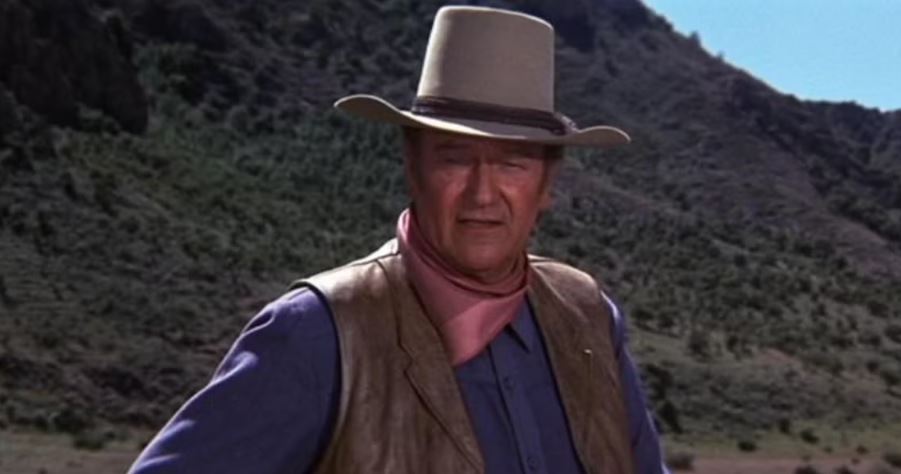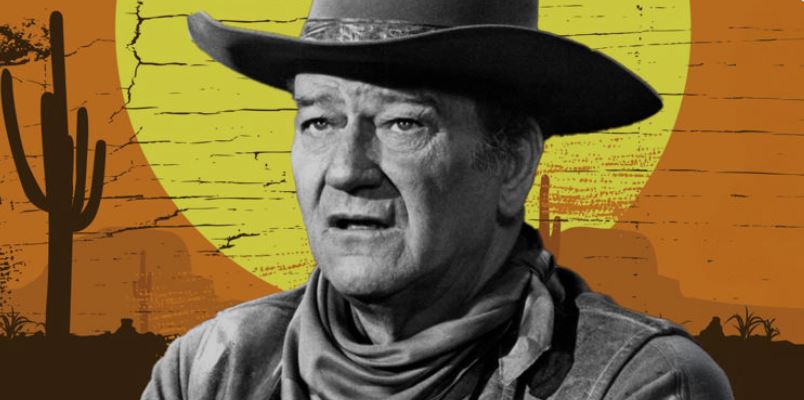By the 1970s, the popularity of the classic Western—which had been the hallmark of John Wayne’s career—was losing ground fast. In its place, revisionist Westerns had surged onto the scene. Sergio Leone’s groundbreaking Spaghetti Westerns, led by the Dollars trilogy and Once Upon a Time in the West, and other revisionist takes of the time, such as Butch Cassidy and the Sundance Kid, had earned a place in the hearts of audiences with their alternative kind of Western hero. In 1970, Wayne made Chisum, an underrated movie straddling the two worlds of the classic Western and this new wave. The movie also adds to Wayne’s complicated legacy, especially regarding his stance on war—from some of his controversial frontier portrayals to his avoiding service in World War II while maintaining a fiercely nationalistic image and outspoken support for the Vietnam War. In fact, just two years before Chisum, Wayne had made The Green Berets, a movie that irked critics, including Roger Ebert, who called it a “virus” for its outright propagandist tone. But in Chisum, Wayne seems to make up for what he has been criticized for throughout his career.
Directed by Andrew V. McLaglen and based on the historical Lincoln County War from Andrew J. Fenady’s short story Chisum and the Lincoln County War, the movie is a slight departure for Wayne, whose character is not only sympathetic to the Native American cause but also resists greedy settler expansionism. 55 years since its release, Chisum is an underrated gem that stands as one of the best war movies of the 1970s while masquerading as a cowboy flick.
John Wayne’s ‘Chisum’ Is a Battle of Ideals

The 1970s saw the release of a flood of anti-establishment war movies, among them Patton, which gave us George C. Scott’s towering, conflicted general. There was also the satirical insanity of M*A*S*H. Chisum, on the other hand, was much quieter and more personal in approach. Unlike the other war films with a clear-cut enemy that served to unite in “us-vs-them” fashion—either a foreign power or faceless bureaucracy—Chisum had a homegrown enemy within. With characters loosely based on real-life figures, the movie stars John Wayne as John Chisum, a frontier tycoon who finds himself between a rock and a hard place when corrupt businessman Lawrence Murphy (Forrest Tucker) teams up with local politicians and law enforcement to acquire anything he can set his hands on, including Chisum’s property.
To Lawrence Murphy, the end justifies the means, even if it means paying bandits to do the scaremongering before he systematically does the grabbing. Wayne’s Chisum, on the other hand, is a reformed gunslinger who gives the law a chance, but this new form of aggression tests his patience. Pushed to the limit, Chisum teams up with the hot-blooded Billy the Kid (Geoffrey Deuel in a smashing performance) to go against the rotten system. It’s a representation that is in line with the era’s disillusionment, something that’s at odds with Wayne’s publicly known stand about the optimism of the Vietnam War. Wayne’s Chisum is a guy who fights not just for survival but also for the ideals he believes define the kind of vision he has for the West he helped conquer. Their fight is over moral ground, with those like Chisum who believe in the possibility of a just society on the one hand and the Murphys of their world on the other.
‘Chisum’ Is a Bridge in John Wayne’s War Filmography

John Wayne’s career was bookended by war. He starred in some of WWII’s greatest movies, including Sands of Iwo Jima and The Longest Day, as well as in the Civil War film How the West Was Won, in which he portrays the legendary General William Sherman. Chisum sits right in the middle as a bridge between genres, a Western that thinks like a war movie as well as for its gray approach to painting war, unlike the black-and-white affair The Green Berets presents. Wayne’s Chisum is not some invincible hero like his youthful cowboys. And when he rallies allies, it’s a unifying call that isn’t about patriotism.
McLaglen, who collaborated with Wayne on movies such as the Western rom-com McLintock! and the Civil War-set The Undefeated, directs Chisum with a somber tone. His pictures are defined by sweeping vistas of perched landscapes with intimate close-ups of Wayne’s weathered face. Even Dominic Frontiere’s score is a mournful one, with its strumming strings evoking the era’s disillusionment. While not far in tone from the movies of the era like Apocalypse Now and The Deer Hunter, Chisum stands out for its lack of the psychedelic chaos that defines the others. Its power is in its subtle battleground that is set in a town square, where victory means surviving with your soul intact. Granted, Chisum might never match the thunderous applause bestowed on Wayne’s True Grit, but its 55-year-old slow-burn story of resistance against corruption will still be relevant for generations to come.
